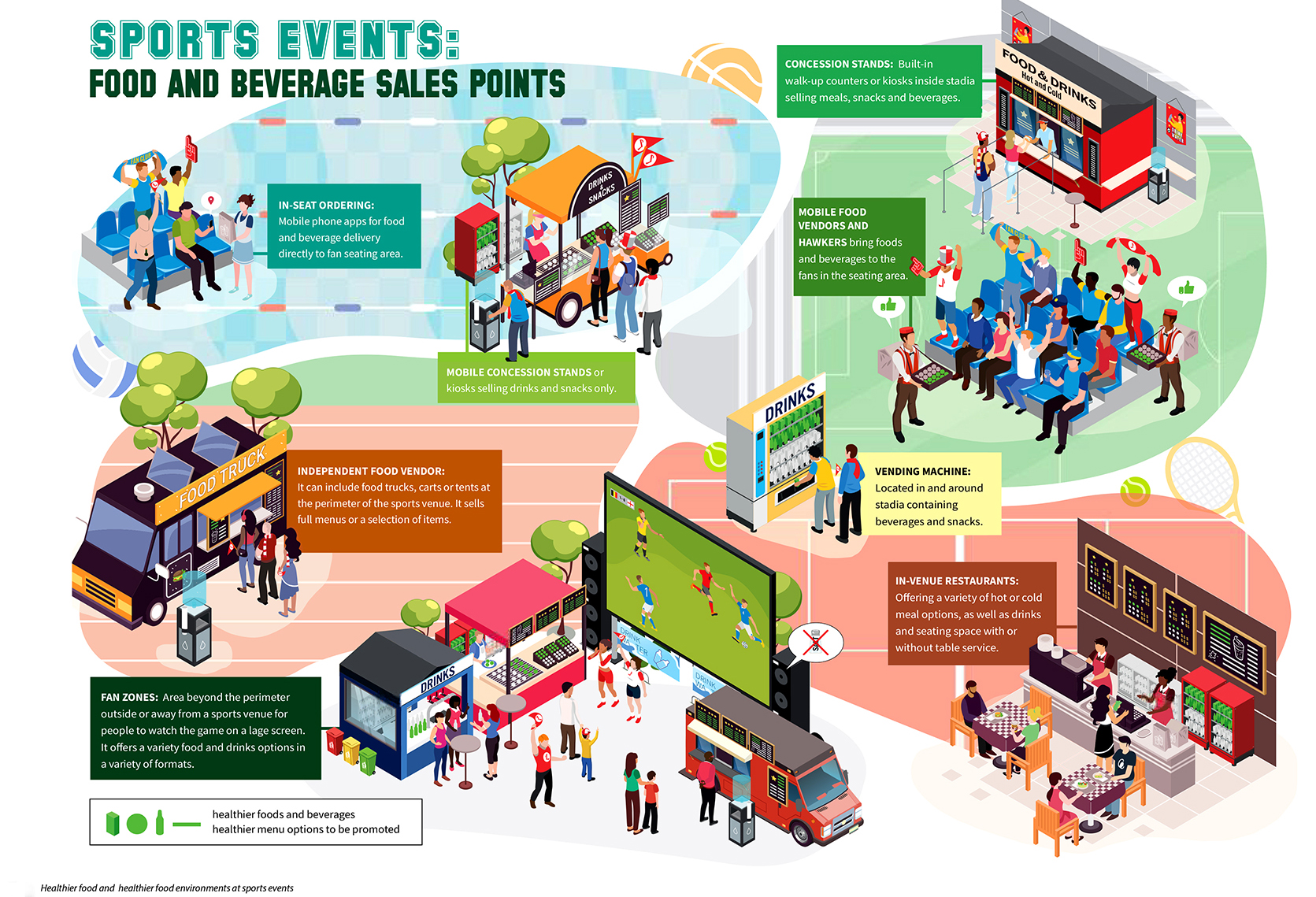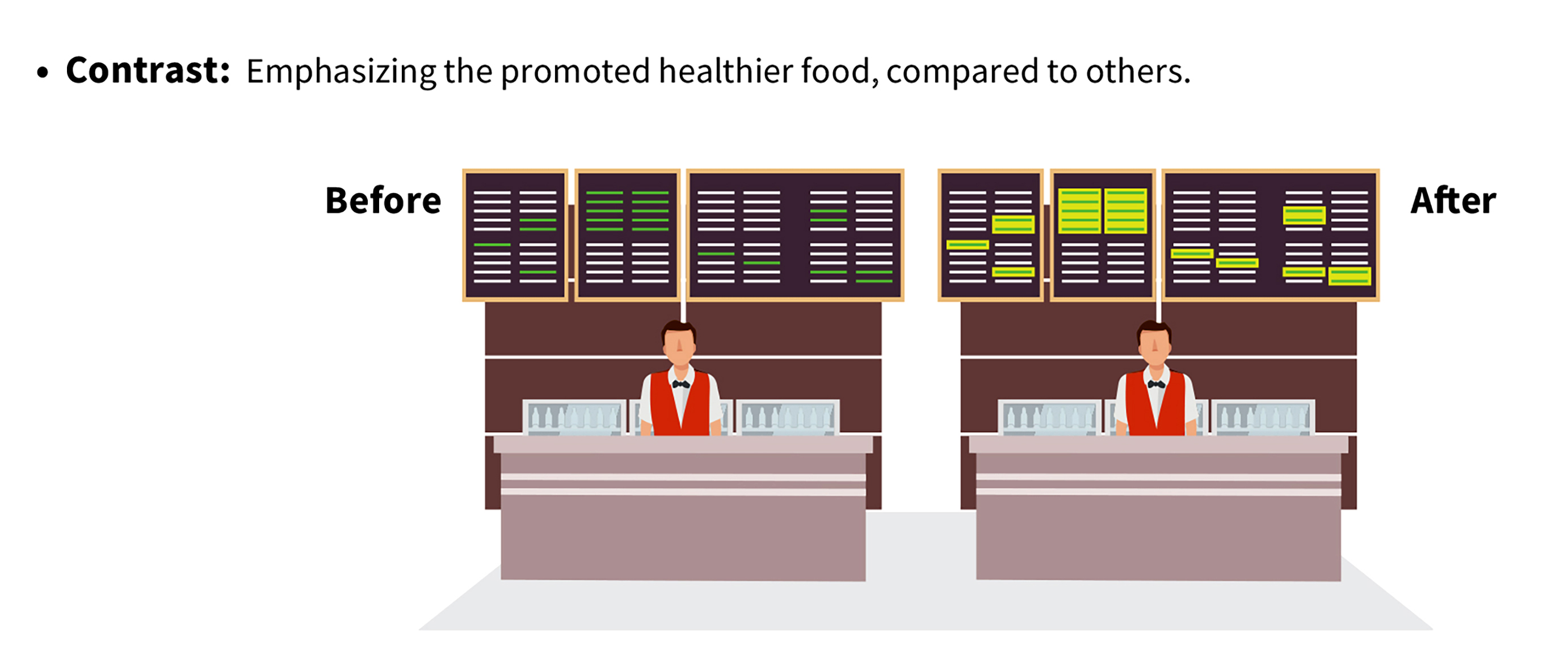The 2022 Fifa World Cup in Qatar was remarkable for more than just Herculean feats of engineering to cool down entire stadiums in one of the hottest countries in the world. It also saw the launch of a groundbreaking global partnership between the World Health Organization (WHO), Fifa and the State of Qatar, putting in place measures “to protect and encourage health” at sports events, including the provision of “healthy food options” inside stadiums and fan zones.
So instead of just hotdogs, potato chips and Coca-Cola (a major sponsor), soccer fans could also buy veggie sticks, mixed nuts, mineral water and Bud Zero. (The new measures meant that 30% of all items on the menus in Qatar’s stadiums had to have “a healthy nutritional profile in line with WHO standards,” WHO said.)
And now, less than a year later, on 24 August, WHO has published an “action guide” for sports event organisers, setting out in detail the parameters for “healthier” foods and drinks at large-scale events.
 The World Health Organization’s new ‘action guide’ recommends ways for sports event organisers to offer healthier food and drink choices at sports events. (Graphic: World Health Organization, 2023.)
The World Health Organization’s new ‘action guide’ recommends ways for sports event organisers to offer healthier food and drink choices at sports events. (Graphic: World Health Organization, 2023.)
It includes a step-by-step “how to” for organisers on changing the foods on offer, from how to build the project team to setting nutrition criteria, developing communication, and training everyone from supervisors to food-service and sales staff.
Also included in the action guide is a measure that may become the most far-reaching of the five actions the guide spells out: Recommendations to restrict the marketing of unhealthy foods and drinks at sports events.
Why is this remarkable? Because establishing new norms for sports events to set a healthy eating example (seemingly an obvious association) has never happened at a global – or broadcasting – level.
The WHO-Fifa-Qatar agreement mandating 30% healthy menu options in stadiums did not prevent Coca-Cola and Anheuser-Busch InBev from featuring as major sponsors of the event, which meant that the marketing of their products in stadiums and on television was unrestricted.
So the marketing and advertising aspect of the guide, in particular, is a much bigger deal than it may appear.
Coca-Cola, the world’s biggest producer of sweetened drinks proven to increase the risk of early death as well as weight gain, diabetes and tooth decay, began advertising at Fifa World Cups in 1950 and remains “one of the longest-standing corporate partners of Fifa” to this day, Fifa’s website unabashedly states, declaring Coca-Cola’s inclusion in its list of “top brands” featured on “one of the most effective international marketing platforms” reaching billions of people in over 200 countries.
(The company is also a longtime partner-sponsor of the Olympic Games.)
While the guide does not (and cannot) regulate or prohibit which foods and drinks are sold or marketed – it can only “recommend” that countries take certain actions – it is a huge step towards shaping a “new normal” for both sports organisers and fans.
And what about the idea that eating “unhealthy stadium food” is part of sports fans’ much-loved overall experience?
A small, unscientific sample by Daily Maverick of local fans confirmed wide availability (at Ikageng, Ellis Park, Centurion, Kings Park, Green Point, Athlone and others) of burgers, beer, chips, Coke and NikNaks.
The guide says that its recommendations are based partly on reports of increasing consumer demand for healthier foods to be available at sports events, though most participants in the same small sample of fans claimed they wouldn’t want that.
‘Nudging’ healthy foods
 The guide includes suggestions for how sports organisers can ‘nudge’ consumers to make healthier choices by highlighting ‘healthier’ options visually, across all formats. (Graphic: World Health Organization, 2023.)
The guide includes suggestions for how sports organisers can ‘nudge’ consumers to make healthier choices by highlighting ‘healthier’ options visually, across all formats. (Graphic: World Health Organization, 2023.)
The guide defines five actions that sports event organisers can take to make the most of their unparalleled opportunity to encourage healthier eating at sports events.
They are: to improve the food offered at events, to use price to incentivise healthier food choices, to communicate and promote healthier foods, to restrict the marketing of foods and drinks high in fats, sugars or salt, and to use “nudging” to promote healthier food choices.
What, you may ask, is “nudging”? We’ve all experienced it: “Nudging” refers to how the choices available to us (“choice architecture” is the technical term) influence what we buy or do.
Typically, nudges influence by reducing the effort needed to make a certain choice, or by highlighting certain options. For example, placing a packet of mixed nuts near the checkout or at eye level rather than a packet of crisps might encourage you to choose the nuts. Or seeing a “healthy” icon next to a fresh salad on a menu might make the salad more appealing than, say, deep-fried chicken.
In talking about the opportunities at or around sports events for communicating about and promoting healthier foods, the guide acknowledges that communication on its own is unlikely to be enough to cause a major shift in consumers’ choices – “because healthy diets are continuously being undermined by the marketing of foods and beverages high in fats, sugars or salt”.
‘Bombarded’ by advertising
Prof Susan Goldstein, a public health specialist and Deputy Director of the SAMRC Centre for Health Economics and Decision Science at Wits University, described the sports environment as having two aspects, “One for the participants, and the other for the spectators.”
In South Africa, she told Daily Maverick, “many sports use the large in-stadium and television audiences to advertise unhealthy foods, [while] youth cricket teams are often sponsored by foods high in fat, salt and sugar, contradicting the possible benefits that sport might hold for the youth.
“Sports participants are commonly bombarded by sugary beverages,” Goldstein added, “especially at road races where Coca-Cola and some energy drinks are the major offerings.” (She noted that, unfortunately, the evidence that physical exercise helps decrease weight is “not great”, except at very high levels of exercise.)
“Advertising unhealthy foods including sugary beverages and alcoholic beverages to spectators, and making them available, not only is bad for the health of the spectators, but there is a hidden implication that because it is a sporting event, there is a link with health. Clearly, this is not the case.”
Goldstein emphasised that getting 30% of food served at stadiums to be “healthier” would be a small improvement, but said that unless the advertising of unhealthy foods is banned, “the effect is going to be short-lasting and harmful for those not lucky enough to get to the sports stadiums”.
“Given the very high rates of obesity in South Africa, especially in children, and the popularity of sport in the country, ‘this is an area of grave concern.”
‘Restricting food not effective’
Daily Maverick asked the National Department of Health to comment on the WHO guide, specifically whether these recommendations might be captured in the upcoming front-of-pack labelling (FOPL) regulations whose public-comment period closed recently.
Health department spokesperson Foster Mohale told Daily Maverick: “The approach thus far through FOPL is not to restrict or ban unhealthy food but to educate the community of the nutritional value of a food so that they make more informed choices about the food they purchase and consume.
“Banning or restriction of food is not an effective policy option – behaviour change through informed nutritional value.”
Though the guide’s target audience is sports event organisers, WHO suggests it should also be used by governments, local authorities and sports stadium managers to create a healthy public food procurement and service policy for sports settings more generally.
Contrary to Mohale’s statement, the guide is evidence of the growing attention worldwide to the “commercial determinants of health” – the activities of business and other private sector actors that affect people’s health directly or indirectly, positively or negatively, making what drives individual “choice” less clear.
Major brands’ marketing and advertising – at sports events and elsewhere – falls into this category of how businesses’ agendas and profit motive can strongly influence the health of the public.
This year’s Rugby World Cup seems to demonstrate some awareness of this shift in perceptions and has only one food or beverage sponsor: Asahi, best known for its beer (Asahi, Peroni, Pilsner Urquell) but also a producer of bottled waters and a “cultured milk” product and a canned coffee.
As the official beverage sponsor of the Rugby World Cup 2023, Asahi “will be providing refreshing drinks to players and fans alike, ensuring that everyone stays hydrated throughout the tournament” (their dominant beer products are not mentioned). DM
The closing date for the public consultation period on South Africa’s draft on front-of-pack labelling for packaged foods, R3776, was 21 September 2023. The draft regulations include measures to restrict child-directed marketing but do not explicitly include live or televised sports events in its proposed restrictions.
The WHO “action guide” for sports organisers is downloadable as a PDF on the WHO website.




 The guide includes suggestions for how sports organisers can ‘nudge’ consumers to make healthier choices by highlighting ‘healthier’ options visually, across all formats. (Graphic: World Health Organization, 2023.)
The guide includes suggestions for how sports organisers can ‘nudge’ consumers to make healthier choices by highlighting ‘healthier’ options visually, across all formats. (Graphic: World Health Organization, 2023.) 